Do you have a 1928 penny and you want to know what it’s worth? Well, it could be worth $10,000 or just a few bucks – it all depends on the quality. This article is a value guide, detailing the different grades and values of the 1928 penny so you know how much you can get for your coin.
The 1928 wheat penny was minted at three different mints (Philadelphia, Denver, and San Francisco) with a total mintage of 182.4 million. The penny is round, smooth-edged, and weighs 3.11 grams. It’s made of a copper-tin-zinc alloy that has a melt value of $0.024 today. But you should never give away this coin for the melt value, as it’s worth much more.
1928 Lincoln Penny: Grades and Values
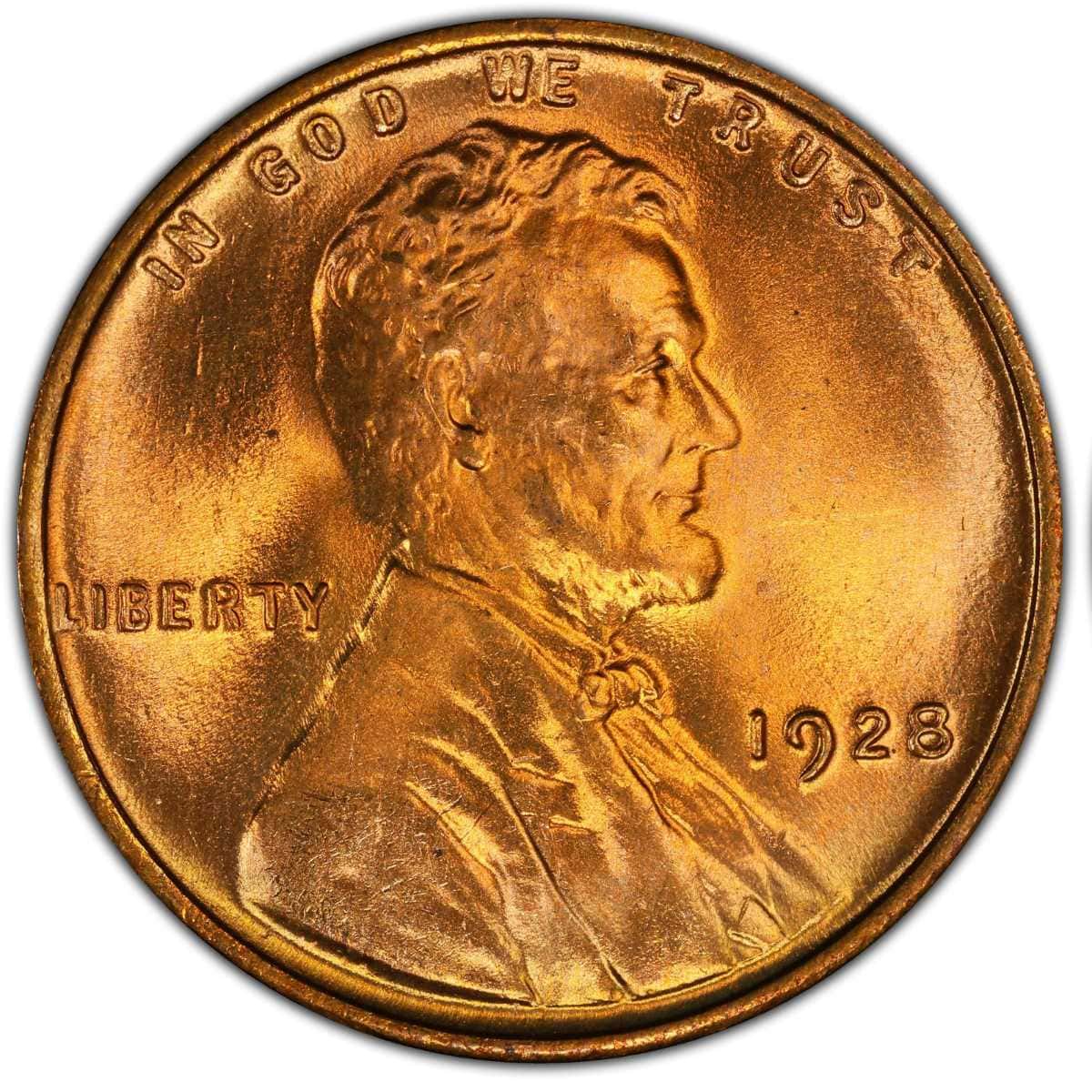
The value of the 1928 Lincoln penny differs significantly between the mintmarks.
For instance, brown coins with no mint mark start at $1 and max out at $65. But the same coins with a D mint mark cost $1 to $135, and if the coin was made in San Francisco, the value range is $1 to $650.
| 1928 Penny: Grade and Value Chart | ||||
| Regular Strike | Good
(G4) |
Extremely Fine
(XF40) |
Uncirculated
(MS60) |
Brilliant uncirculated
(MS65) |
| No mint mark
(P) |
$1 |
$3 |
$14 (BN)
$15(RB) $16 (RD) |
$65 (BN)
$150 (RB) $200 (RD) |
| D penny |
$1 |
$14 |
$42 (BN)
$50 (RB) $60 (RD) |
$135 (BN)
$225 (RB) $450 (RD) |
| S penny |
$1 |
$20 |
$100 (BN)
$100 (RB) $135 (RD) |
$650 (BN)
$1,850 (RB) $10,000 (RD) |
The most valuable 1928 pennies are the red uncirculated pennies starting at MS60. Like brown coins, the prices for red uncirculated 1928 pennies are also heavily influenced by the mintmark on the coin.
Again, the Philadelphia coins are worth the least, MS60 goes for $16 and MS65 for $200. Similarly, San Francisco reds have the highest value of $20 for MS60 red pennies and a whopping $10,000 for an MS65.
1928 No Mint Mark (P) Penny: Value and Grading
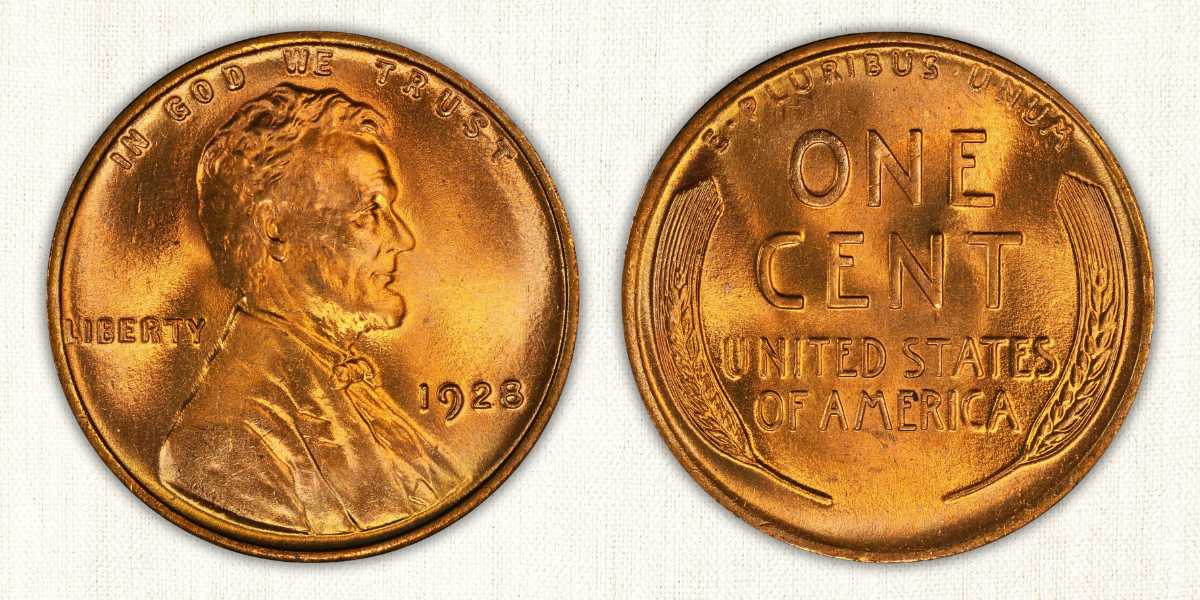
Due to its moderately high mintage of 134 million, the 1928 no-mint mark penny is a common coin in circulated grades. Even uncirculated grades below MS65 are also fairly common, but from MS66 and up, the coins become less accessible.
Brown pennies which are mostly circulated aren’t expensive, and the best ones cost $10. While the uncirculated cost $14 for MS60 and $65 for MS65.
Moving on to the red and brown pennies, since these are a bit less common, they have a higher value. It will cost you about $22 to get an MS62, $75 for MS65, and $185 for MS66.
Red coins which are the most valuable 1928 (P) Lincoln cents are not so plentiful in lower MS grades. They start at MS63 which costs $55, an MS65 costs $200, and a gem uncirculated MS67 costs $6,000.
But the coins can sometimes cost more than $6,000. The highest recorded amount for a 1928 (P) wheat penny is $7,200 for an MS67 auctioned by Heritage Auctions in June 2019.
| 1928 No Mint mark (P) Penny Value List | |||
| Grade | Brown (BN) | Red and Brown (RB) | Red (RD) |
| Good (G4) | $1 | – | – |
| Fine (F12) | $1 | – | – |
| Extremely Fine(XF40) | $3 | – | – |
| About Uncirculated (AU50) | $5 | – | – |
| MS 60 | $14 | – | – |
| MS 61 | $16 | – | – |
| MS 62 | $18 | $22 | – |
| MS 62+ | $20 | $25 | – |
| MS 63 | $25 | $40 | $55 |
| MS 63+ | $28 | $48 | $70 |
| MS 64 | $36 | $75 | $110 |
| MS 64+ | $45 | $90 | $135 |
| MS 65 | $65 | $150 | $200 |
| MS 65+ | – | $160 | $260 |
| MS 66 | – | $185 | $450 |
| MS 66+ | – | $210 | $525 |
| MS 67 | – | – | $1,300 |
| MS 67+ | – | – | $6000 |
| MS 68 | – | – | $45,000 |
1928-D Penny: Grading and Value
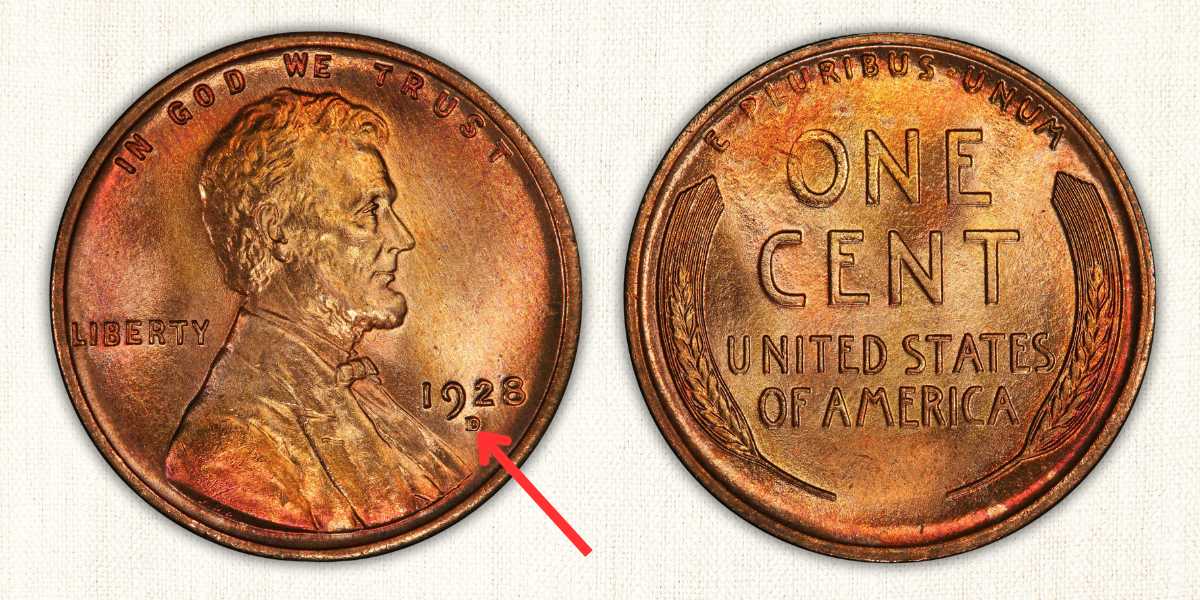
The Denver mint struck approximately 31.1 million Lincoln wheat pennies in 1928. This mintage is about a quarter of that of Philadelphia, so while circulated grades are fairly common, uncirculated grades of the 1928-D are a bit scarce, and coins above MS65 are difficult to come by.
A circulated brown 1928-D penny costs between $1 and $36. Crossing into the uncirculated grades, you can get an MS60 for $42 and an MS65 for $250.
Red-brown 1928-D pennies are slightly higher priced, they start at $50 for an MS60 and MS64 goes for $175, while an M65 will cost you $450.
Even the shiny red coins don’t command much premium at the lower uncirculated grades. A red MS60 at $60 is only $10 higher than a red-brown coin of the same grade. Only after MS65 will you see a big change in prices and MS65 1928-D penny costs $1,250 while MS66 costs $10,000.
But the most expensive 1928-D penny is a red MS66 sold by Heritage Auctions in 2022, the coin sold for $12,600.
| 1928-D Penny: Grade and Value List | |||
| Grade | Brown (BN) | Red and Brown (RB) | Red (RD) |
| Good (G4) | $1 | – | – |
| Very Fine (F20) | $4 | – | – |
| Extremely Fine(XF40) | $14 | – | – |
| About Uncirculated (AU50) | $22 | – | – |
| About Uncirculated (AU58) | $36 | – | – |
| MS 60 | $42 | $50 | $60 |
| MS 61 | $48 | $57 | $75 |
| MS 62 | $50 | $72 | $100 |
| MS 62+ | $55 | $76 | $115 |
| MS 63 | $65 | $90 | $150 |
| MS 63+ | $75 | $100 | $185 |
| MS 64 | $100 | $175 | $300 |
| MS 64+ | $135 | $225 | $450 |
| MS 65 | $275 | $450 | $1,250 |
| MS 65+ | $350 | – | $3,000 |
| MS 66 | $650 | – | $10,500 |
| MS 66+ | – | – | $62,000 |
1928-S Penny: Grading and Value
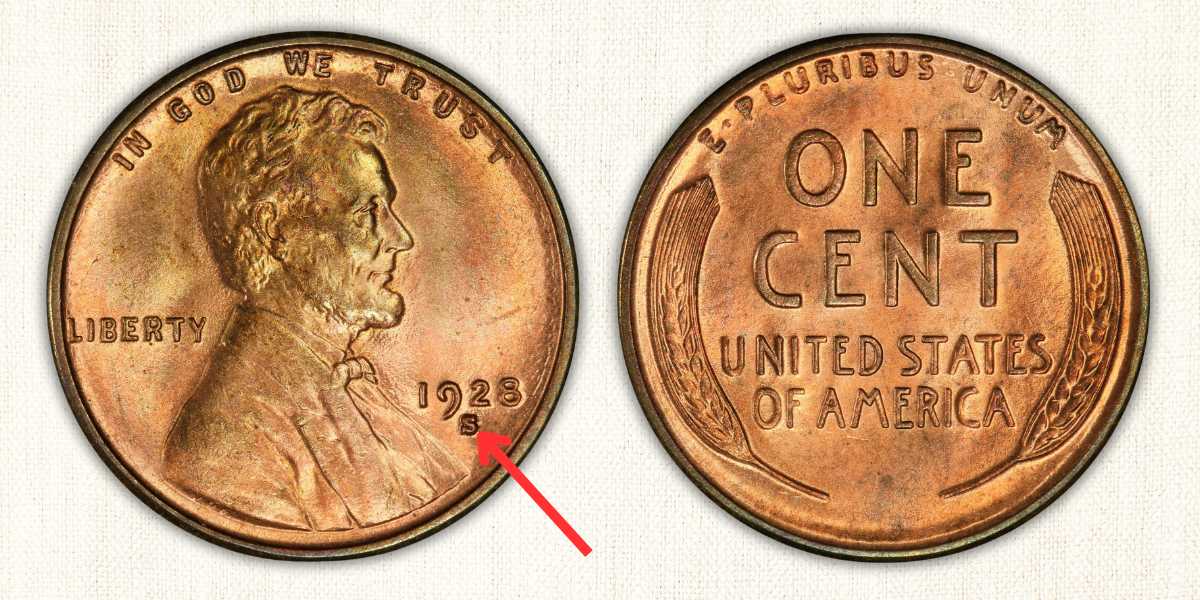
The 1928-S penny from the San Francisco Mint is the least common of all the 1928 pennies due to its mintage of just 17 million. This fact alone already makes the coin valuable. But in addition to being rare, the 1928-S pennies also have good quality. Most are well-struck and have sharp, clear details.
As a result, all grades of the 1928-S Lincoln penny are worth more than the other two mintmarks. Brown circulated coins are valued between $1 to $30. While about-uncirculated 1928-S pennies are valued at $30 to $90, which is more than some red uncirculated pennies from Denver and Philadelphia. Uncirculated browns go for $100 to $650.
The next in value are the red and brown pennies. These coins are usually uncirculated, and at MS60 they go for $100, and the price rises steadily to $2,150 for an MS65.
Naturally, the most valuable are the red 1928-S pennies. An MS60 costs $135. The price shoots up to $10,000 for MS65 red pennies, and an MS66 costs a whopping $55,000.
However, the auction record for the 1928-S wheat penny is a bit less impressive, it stands at $46,000 for an MS66 sold by Heritage Auctions in April 2020. But if the same coin was auctioned today, it would sell for an amount equal to or more than the present going rate for MS66 1928-S pennies.
| 1928-S Penny: Grade and Value chart | |||
| Grade | Brown (BN) | Red and Brown (RB) | Red (RD) |
| Good (G4) | $1 | – | – |
| Fine (F12) | $3 | – | – |
| Very Fine (VF20) | $6 | – | – |
| Extremely Fine(XF40) | $20 | – | – |
| About Uncirculated (AU50) | $32 | – | – |
| About Uncirculated (AU55) | $65 | – | – |
| About Uncirculated (AU58) | $90 | – | – |
| MS 60 | $100 | $100 | $135 |
| MS 61 | $110 | $125 | $165 |
| MS 62 | $140 | $150 | $300 |
| MS 62+ | $160 | $215 | $325 |
| MS 63 | $215 | $450 | $550 |
| MS 63+ | $225 | $550 | $675 |
| MS 64 | $250 | $900 | $1,600 |
| MS 64+ | $325 | $1,050 | $2,250 |
| MS 65 | $650 | $1,850 | $10,000 |
| MS 65+ | – | $2,150 | $12,000 |
| MS 66 | – | – | $55,000 |
1928 Lincoln Penny: Error Coins
All thanks to its significantly larger mintage, most error 1928 pennies you’ll find will be no-mint mark coins from Philadelphia. The common errors include off-center strikes and alloy errors: the prices for these are similar to the regular 1928 pennies of the same grade.
However, rare error coins like wrong planchet errors are popular with numismatists and can fetch a premium amount.
1928 Penny with Wood Grain Improper Alloy Error
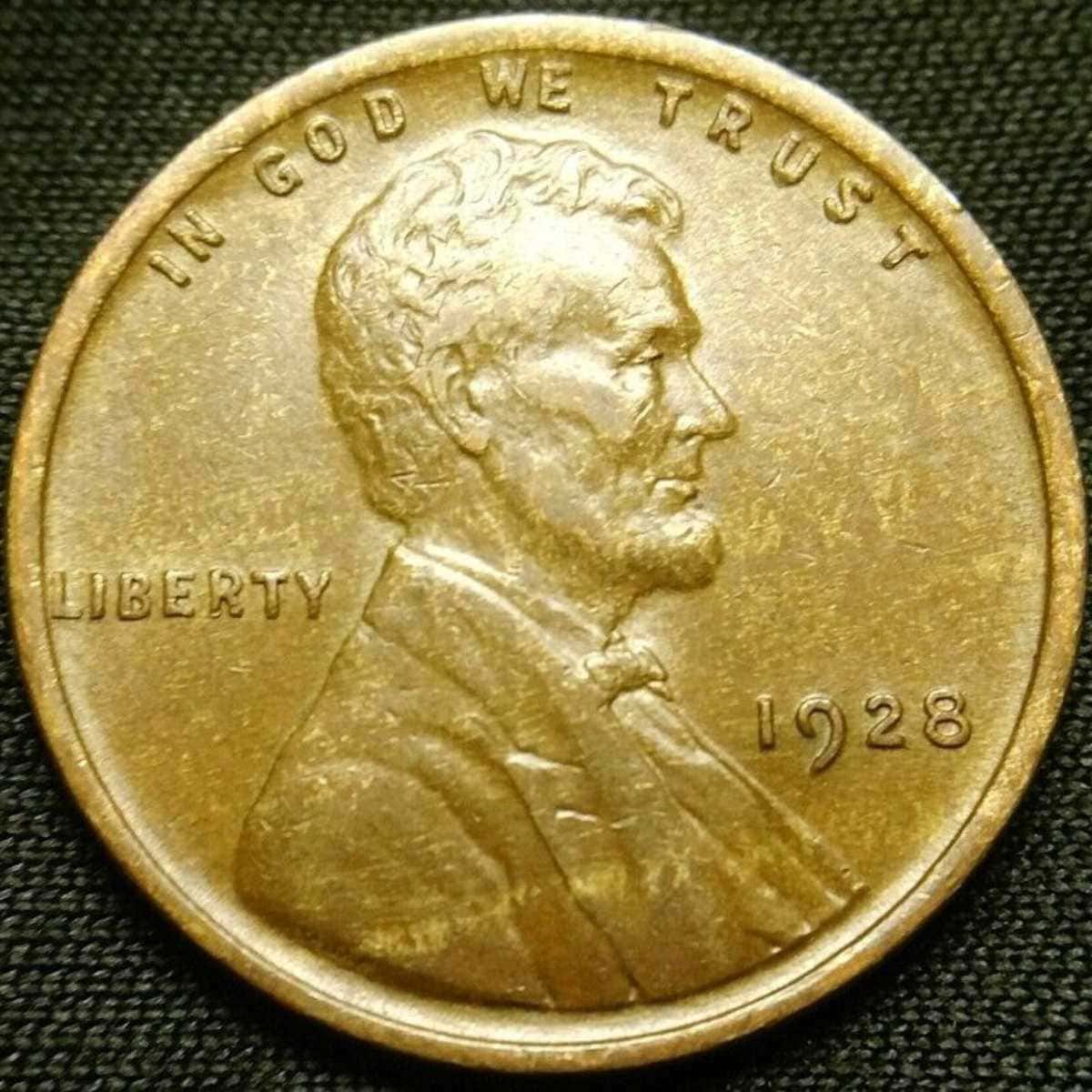
This coin is a 1928 no-mint mark Lincoln penny with an obvious alloy mixture error.
Rather than a uniform color, the penny has a mottled appearance with multiple light brown spots, like a wood grain. This grainy appearance affects the obverse and reverse sides of the coin and is due to an improper mix of copper, zinc, and tin.
The coin is circulated and shows some signs of wear. You can get this mottled coin for about $9
1928 Lincoln Penny with Struck on Wrong Planchet
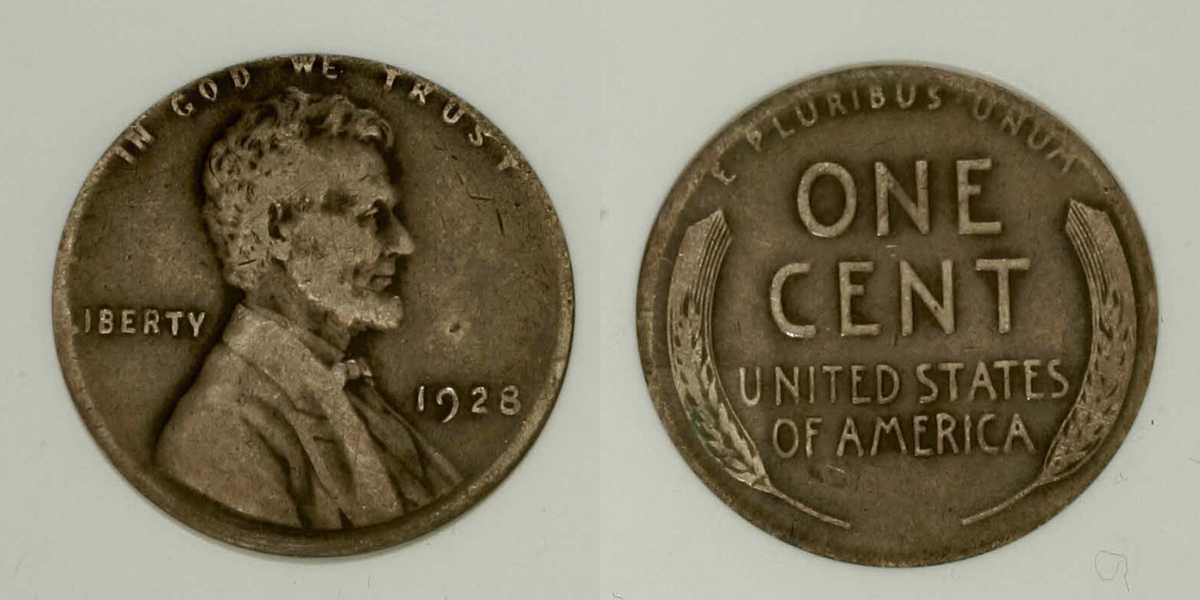
This 1928 (P) penny has been struck on a dime Planchet. And since a dime is smaller than a penny, some details of the penny have been cut out.
The missing details are mostly the lettering at the top of the coin on the obverse and reverse faces, only the bottom halves of the letters are visible on the coin.
This error needs little explanation, a dime planchet was mistakenly put into the dies for pennies. The coin is circulated and certified by ANACS as F12, it is worth $1,035.
1928 Lincoln Penny with Struck on Silver Planchet
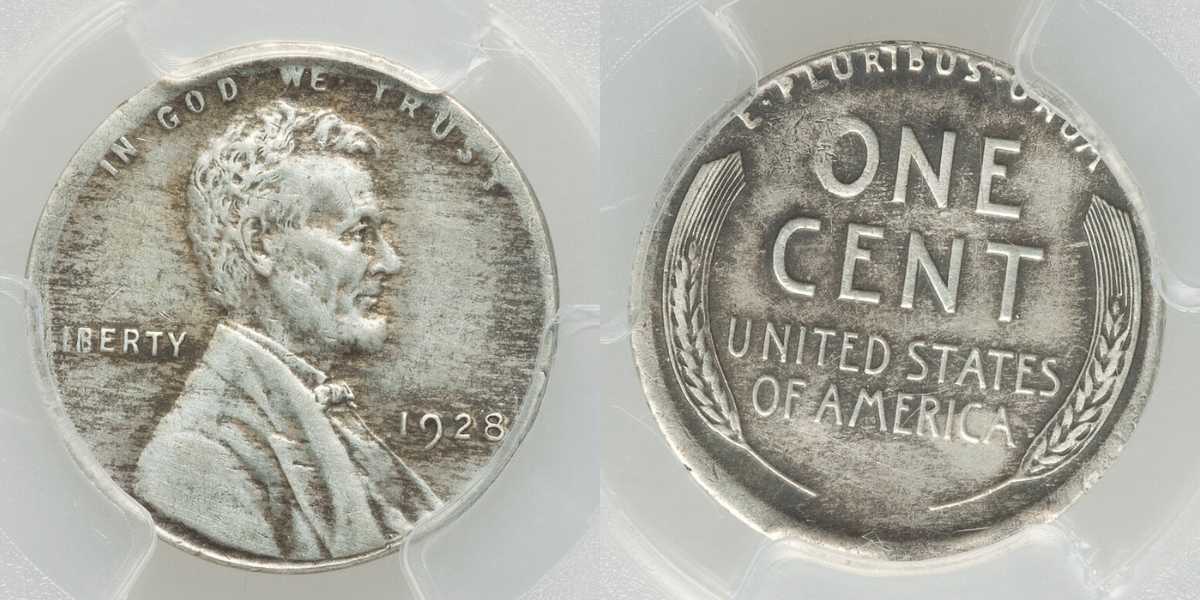
Another 1928 Lincoln cent that’s been struck on a 10-cent silver dime planchet.
The difference between this coin and the previous one is that this one has a higher grade of extremely fine and you can see this from the brighter color and sharper detail. Other than that, the error is much the same; the tops of the letters have been cut off.
The coin has a PCGS XF45 grade, and it’s valued at $4,320.
1928 Lincoln Penny with Rotated Die Error
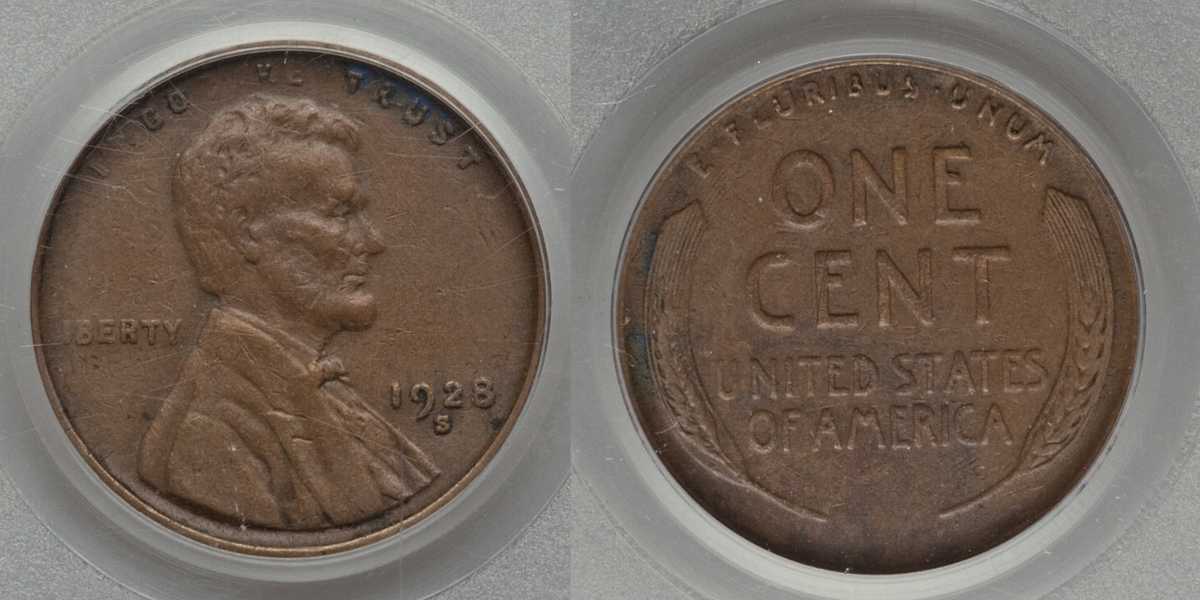
This coin is a 1928-S penny with a rotated die error. A rotated die error happens when the obverse or reverse die turns out of alignment.
With rotated dies, when you flip the coin, the image isn’t upright but tilted to the left or right. The degree of rotation might be as much as 90 degrees or it could be a small rotation as is the case with this 1928-S penny, you see that the reverse design is tilted slightly to the left.
The coin has a PCGS grading of XF40 and is worth $200
1928 Lincoln Penny with Struck 15% Off Center Error
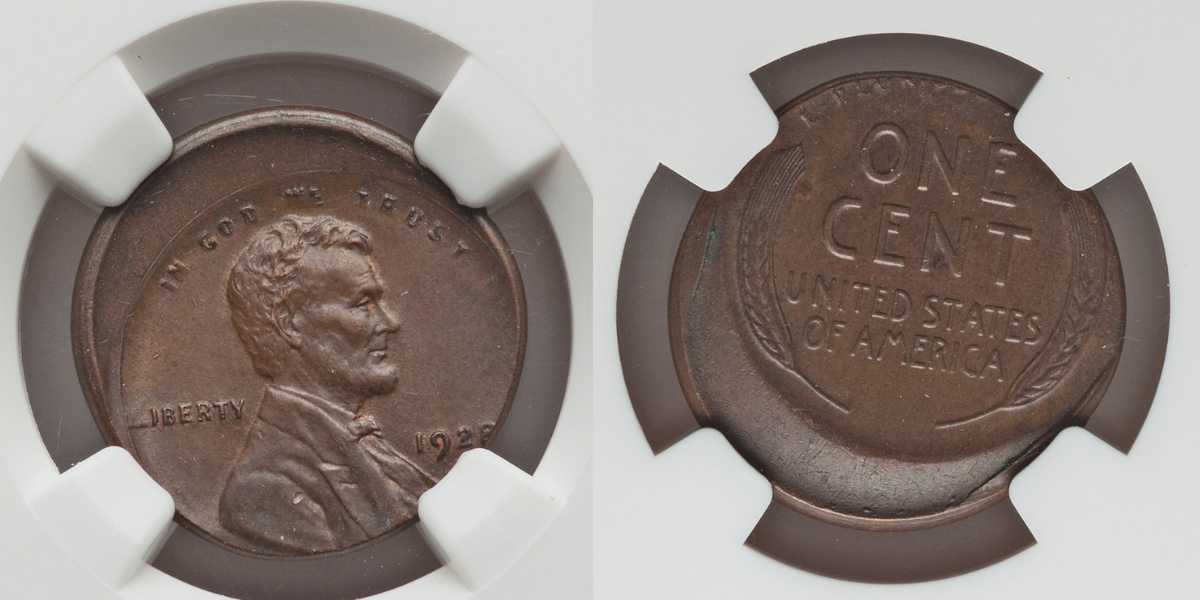
Here’s a 1928 (P) penny that’s been struck off-center. Off-center strikes occur when a planchet isn’t properly positioned on the dies.
This coin was struck 15% off center. On the obverse the strike is at 5 O’clock, leaving a blank area at the top. The error also affects the reverse, cutting off the lettering at the top.
Despite the error, this 1928 penny is still worth about $460, as it’s an MS61 coin.
1928 Lincoln Penny with Struck 50% Off Center
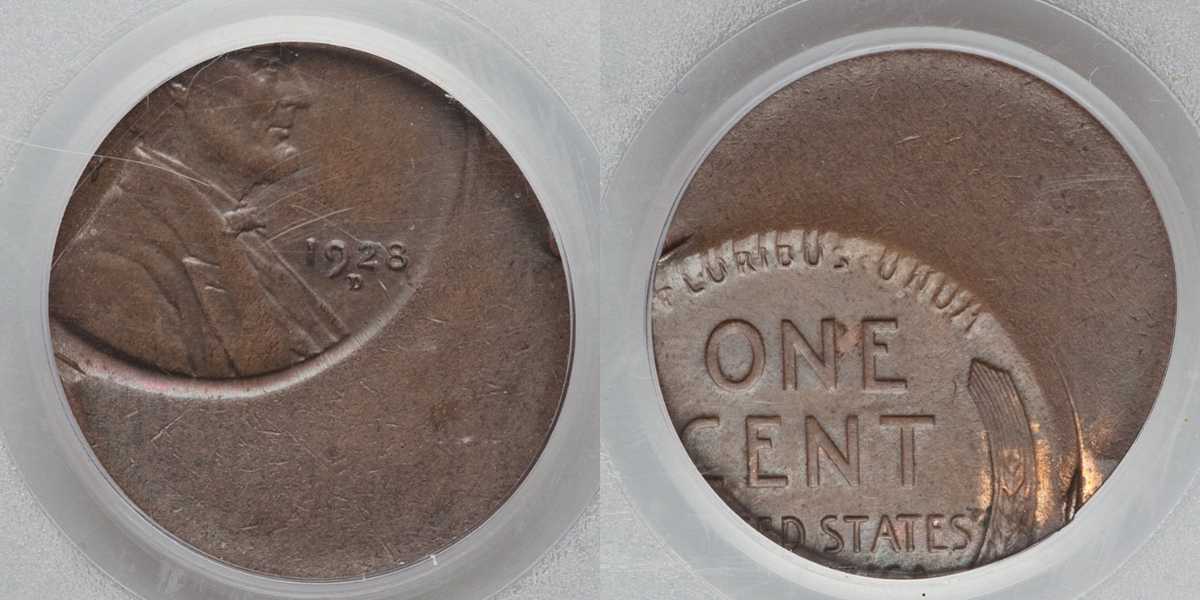
This is another off-center penny, a 1928-D this time. The strike is 50% off center, leaving about half of the coin blank and also only capturing half of the coin design.
The obverse shows just the lower half of Lincoln’s face, the issue date, and the mintmark. Other elements like the lettering aren’t shown. The coin is an uncirculated MS63 brown, and it is worth $630
1928 Lincoln Penny with Broad Strike and Off-Center Error
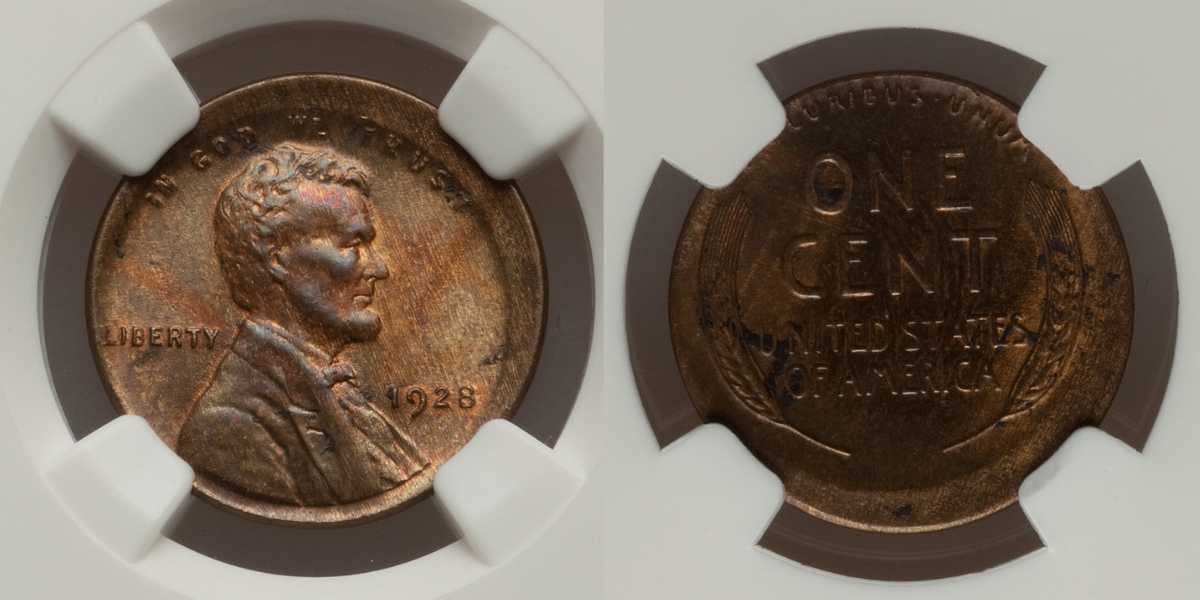
Here is a 1928 (P) wheat penny with a broad strike error. It is NGC-certified as about-uncirculated, and it goes for around $36.
A broad strike occurs when there’s a failure of the collars that hold the planchet and shape the edge during the strike. The coin will turn out flattened and wider than normal but still have the design engraved on it.
Besides the broad strike, the penny is also a bit off-center. But unlike the previous off-center coins on the list, this one has all the elements of the design because broad-struck coins are wider, allowing the planchet to accommodate an off-center strike of 5 to 10%
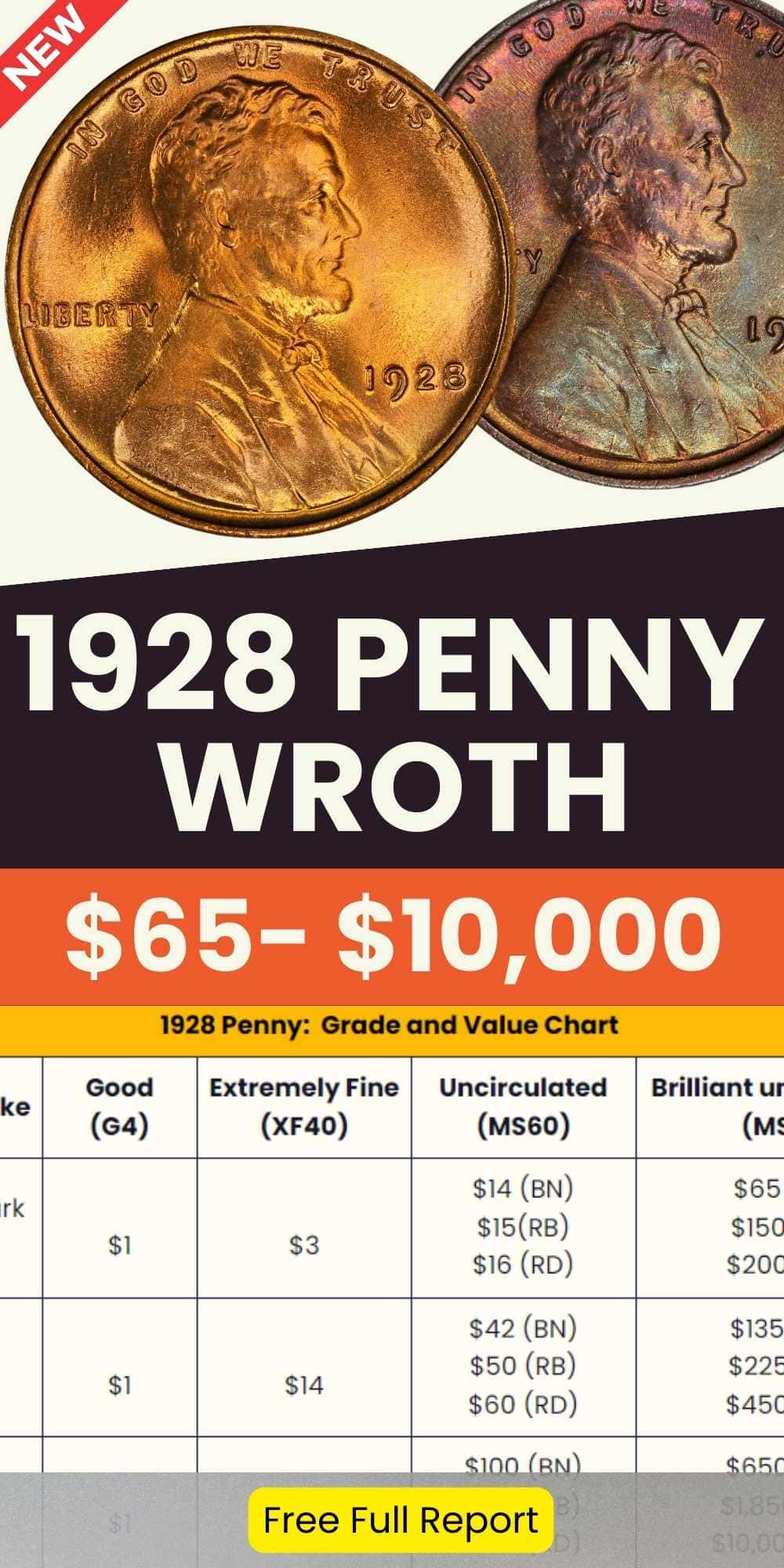

Jenson is a professional numismatist, a dedicated coin collector, a graduate of the College of Business at Oregon State, a life member of the American Numismatic Association (ANA), and an overall coin nerd. He is the founder of Coin Value List.
